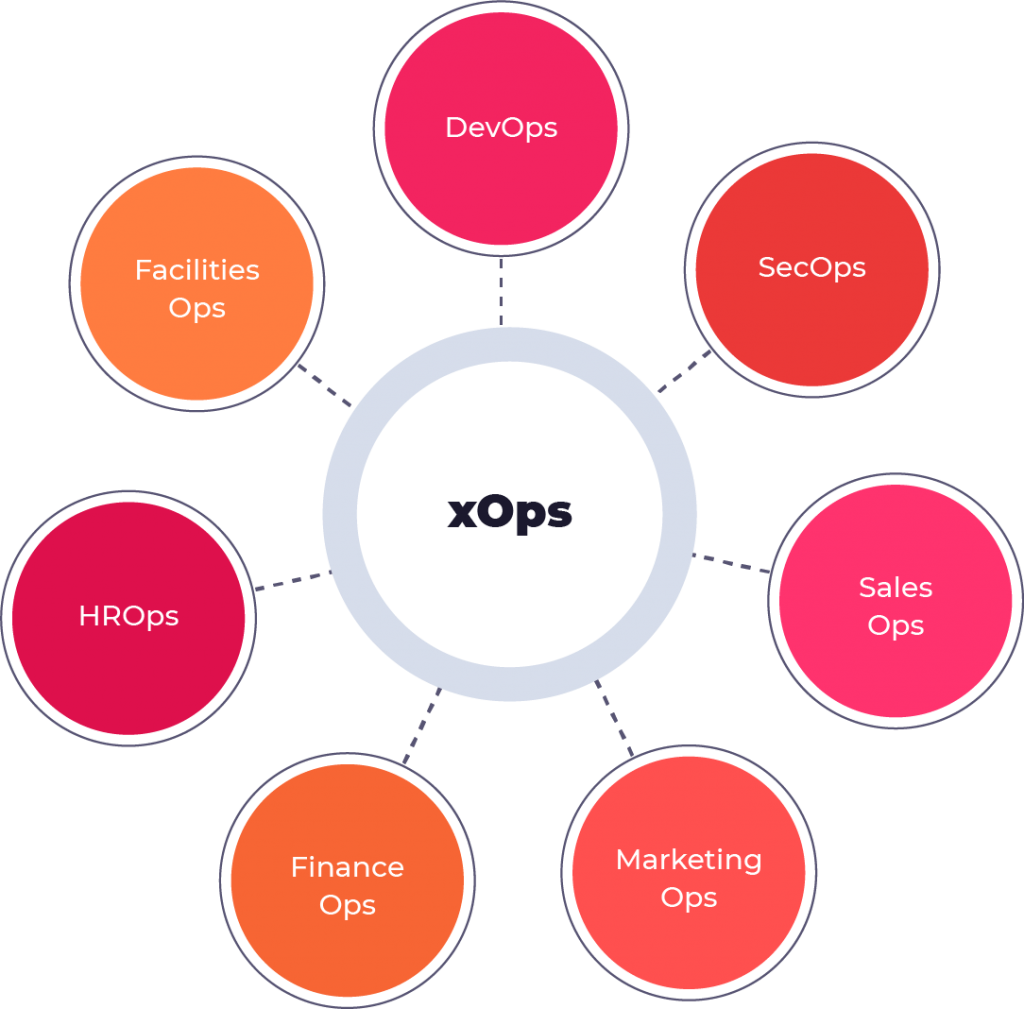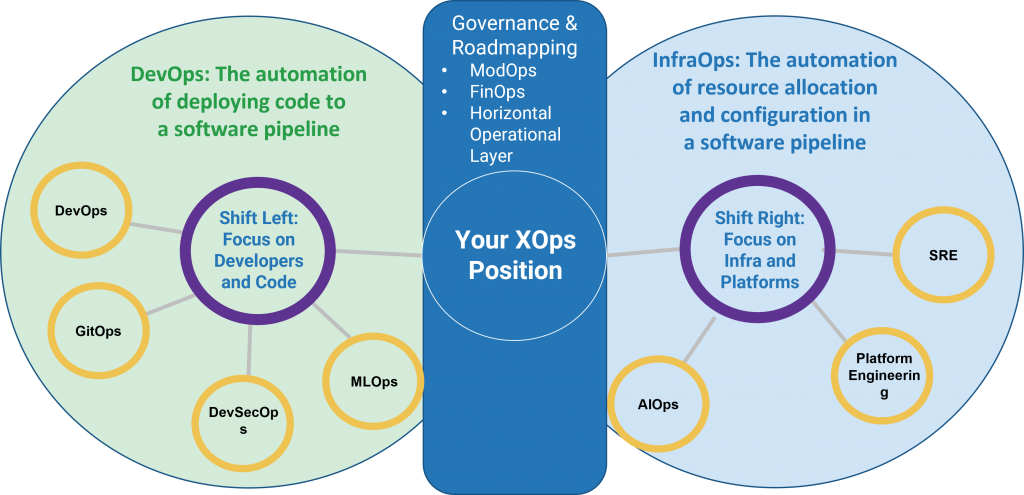
The term “XOps” is a broad concept that extends the principles of DevOps to various specialized or niche areas within an organization’s operations. The “X” in XOps can represent different functional areas or domains, such as Security (SecOps), Data (DataOps), Machine Learning (MLOps), Artificial Intelligence (AIOps), and more. Essentially, XOps represents the idea of applying DevOps principles and practices to these specialized fields to streamline processes, improve collaboration, and achieve better outcomes.
Here are some examples of XOps:
- SecOps (Security Operations): SecOps extends DevOps practices to security, emphasizing the integration of security into the software development and IT operations processes to protect against threats and vulnerabilities.
- DataOps (Data Operations): DataOps applies DevOps principles to data management, focusing on data integration, quality, and collaboration between data teams and operations teams to ensure efficient and reliable data processes.
- MLOps (Machine Learning Operations): MLOps combines machine learning with DevOps practices to automate the deployment, monitoring, and management of machine learning models in production environments.
- AIOps (Artificial Intelligence Operations): AIOps integrates artificial intelligence and machine learning into IT operations to enhance monitoring, incident response, and infrastructure management through automation and predictive analytics.
- FinOps (Financial Operations): FinOps applies DevOps principles to cloud cost management and financial operations, helping organizations optimize cloud spending and budget allocation.
- DevSecOps (Development, Security, and Operations): DevSecOps integrates security into the entire DevOps pipeline, ensuring that security considerations are addressed throughout the software development and operations lifecycle.
Why Do We Need XOps?
- Specialization: Each specialized area represented by XOps has its unique challenges and requirements. Applying DevOps principles to these areas ensures that they benefit from the same efficiency and collaboration improvements that DevOps brings to software development and IT operations.
- Collaboration: XOps encourages cross-functional collaboration and communication, breaking down silos between different teams within an organization. This collaboration leads to better outcomes and faster problem resolution.
- Efficiency: By automating processes and standardizing practices, XOps helps organizations streamline operations, reduce manual effort, and eliminate bottlenecks, leading to increased efficiency.
- Risk Mitigation: Applying DevOps practices to specialized areas like security (SecOps) and compliance (ComplianceOps) helps organizations identify and address risks proactively, reducing the likelihood of security breaches and compliance violations.
- Cost Control: XOps practices, such as FinOps, help organizations optimize resource allocation and control costs in specialized domains.
- Scalability: XOps practices can scale with an organization’s growth, ensuring that processes remain efficient and effective as operations expand.
- Continuous Improvement: XOps encourages a culture of continuous improvement and learning, fostering innovation and adaptability within specialized areas.
- Alignment with Business Goals: By aligning specialized areas with business objectives and customer needs, XOps practices contribute to the overall success of the organization.
XOps extends the principles of DevOps to specialized areas within an organization’s operations, promoting collaboration, efficiency, risk mitigation, and alignment with business goals. It helps organizations address the unique challenges and requirements of these specialized domains while benefiting from the best practices established by the DevOps movement.
What is the Advantage of XOps?
- Specialized Efficiency: XOps allows for the application of DevOps principles tailored to specific domains, optimizing processes and operations in those areas.
- Improved Collaboration: XOps promotes cross-functional collaboration between teams, breaking down silos and improving communication.
- Efficiency Gains: Automation and standardization in specialized domains lead to increased efficiency, reducing manual effort and operational bottlenecks.
- Risk Mitigation: XOps practices in security (SecOps), compliance (ComplianceOps), and other areas help organizations identify and mitigate risks proactively.
- Cost Control: Practices like FinOps help optimize resource allocation and control costs in specialized domains, contributing to financial efficiency.
- Scalability: XOps practices can scale with an organization’s growth, ensuring that operations remain efficient and effective as they expand.
- Continuous Improvement: XOps fosters a culture of continuous improvement and learning, driving innovation and adaptability within specialized areas.
- Alignment with Business Goals: XOps aligns specialized areas with business objectives and customer needs, contributing to the overall success of the organization.
What is the feature of XOps?
- Domain Focus: XOps applies DevOps principles and practices to specialized areas such as security (SecOps), data (DataOps), machine learning (MLOps), and more.
- Collaboration: Improved cross-functional collaboration and communication are fundamental features of XOps, enhancing cooperation between teams within an organization.
- Efficiency and Automation: Automation and standardization are core features, enabling efficient and consistent processes in specialized domains.
- Risk Management: XOps practices prioritize risk management and mitigation, ensuring that specialized areas are well-protected and compliant.
- Cost Optimization: XOps practices like FinOps focus on optimizing resource allocation and controlling costs in specialized domains.
- Scalability: XOps processes and practices are designed to scale as an organization grows, adapting to changing requirements.
- Continuous Improvement: A culture of continuous improvement and learning is encouraged within specialized areas, driving innovation and adaptability.
- Alignment with Business Objectives: XOps aligns the goals of specialized areas with the broader business objectives, ensuring that operations contribute to the organization’s success.
- Integration with DevOps: XOps is often integrated with broader DevOps practices, ensuring consistency and alignment across the organization.
XOps offers several advantages by applying DevOps principles to specialized domains within an organization. Its features encompass a range of practices and processes that enhance efficiency, collaboration, risk management, and alignment with business goals in these specialized areas.
What is the Top 10 Use cases of XOps?

XOps is a relatively new term that refers to the convergence of different IT operations disciplines, such as DevOps, DevSecOps, AIOps, MLOps, and BizDevOps. It is an umbrella term that encompasses the practices and technologies used to automate, optimize, and secure IT operations.
The top 10 use cases of XOps are:
- Automating IT operations. XOps can be used to automate tasks such as provisioning, configuration, deployment, and monitoring. This can help to reduce errors and improve efficiency.
- Optimizing IT operations. XOps can be used to optimize IT operations by identifying and eliminating waste. This can help to improve cost-efficiency.
- Securing IT operations. XOps can be used to secure IT operations by implementing security best practices and automating security checks. This can help to protect data and systems from cyberattacks.
- Improving collaboration. XOps can be used to improve collaboration between different teams involved in IT operations. This can aid in ensuring that everyone is working towards the same objective.
- Increasing agility. XOps can be used to increase the agility of IT operations by making it easier to make changes. This can help organizations respond quickly to changes in the business environment.
- Improving compliance. XOps can be used to improve compliance with regulations by automating compliance checks and providing visibility into compliance status.
- Reducing costs. XOps can be used to reduce costs by automating tasks and optimizing resources. This can help industries save money on IT operations.
- Improving customer experience. XOps can be used to improve the customer experience by reducing the time it takes to resolve issues. This can help industries increase customer satisfaction.
- Improving employee productivity. XOps can be used to improve employee productivity by automating tasks and providing employees with the tools they need to do their jobs.
- Leveraging data and analytics. XOps can be used to leverage data and analytics to improve decision-making. This can help organizations make better decisions about IT operations.
How to Implement XOps?
The way to implement XOps depends on the specific needs of the organization. However, some common steps include:
- Establishing a cross-functional team. XOps should be implemented by a cross-functional team that includes representatives from different IT operations disciplines.
- Defining the goals of XOps. The team should define the goals of XOps, such as improving efficiency, reducing costs, or improving compliance.
- Identifying the tools and technologies needed. The team should identify the tools and technologies needed to implement XOps.
- Developing a plan for implementation. The team should develop a plan for implementing XOps. This plan should include specific goals, responsibilities, and timelines.
- Implementing the plan. The team should implement the plan for XOps.
- Monitoring and improving. The team should monitor the implementation of XOps and make improvements as needed.
XOps is a complex undertaking, but it can be a very rewarding one. By implementing XOps, organizations can improve the efficiency, effectiveness, and security of their IT operations.
Here are some additional considerations for implementing XOps:
- You need to have a strong understanding of your IT operations.
- You need to have the support of your team and your organization.
- You need to be willing to invest in the right tools and technologies.
If you are considering implementing XOps, I recommend that you start by talking to an XOps consultant. They can help you assess your needs and develop a plan for implementation.
How to Get certified in XOps?
- DevOpsSchool.com
- scmGalaxy.com
- BestDevOps.com
- Cotocus.com

There are currently no XOps-specific certification exams available. However, there are a number of certifications that can help you learn the fundamentals of XOps, such as:
- DevOps Certified Professional (DCCP): This certification is offered by the Linux Foundation and covers the fundamentals of DevOps.
- Google Cloud Certified – Professional Cloud Architect: This certification is offered by Google Cloud and covers the skills and knowledge needed to design, deploy, and manage cloud solutions.
- AWS Certified Solutions Architect – Associate: This certification is offered by Amazon Web Services and covers the skills and knowledge needed to design and deploy cloud solutions.
- Microsoft Certified Azure Solutions Architect Expert: This certification is offered by Microsoft and covers the skills and knowledge needed to design and deploy cloud solutions.
In addition to certifications, there are a number of other resources that can help you learn XOps, such as:
- Books: There are a number of books available on XOps, such as “XOps: The Convergence of DevOps, SecOps, AIOps, and MLOps” by Thomas Erl.
- Articles: There are a number of articles available on XOps, such as “What is XOps?” by Gartner.
- Online courses: There are a number of online courses available on XOps, such as “XOps: The Future of IT Operations” by Pluralsight.
- Workshops: There are a number of workshops available on XOps, such as “XOps: The Convergence of DevOps, SecOps, AIOps, and MLOps” by Google Cloud.
- Conferences: There are a number of conferences that cover XOps, such as the DevOps Summit and the Cloud Native Computing Foundation (CNCF) Summit.
How to Learn XOps?

The best way to learn XOps is to use a combination of these resources. Start by getting a good understanding of the fundamentals of DevOps, cloud computing, and security. Then, focus on learning about the specific XOps practices and technologies that are relevant to your organization.
Some additional tips for learning XOps:
- Get involved in the community. There is a growing community of XOps professionals who are active on social media and in online forums. Get involved in this community to learn from others and stay up-to-date on the latest XOps trends.
- Attend conferences and workshops. Attending conferences and workshops is a great way to learn about XOps from experts.
- Get hands-on experience. The best way to learn XOps is to get hands-on experience with it. You can do this by setting up a XOps environment in the cloud or by working on a XOps project at your job.
XOps is a rapidly growing field, and there is a high demand for XOps professionals. By learning XOps, you can position yourself for a successful career in this field.
- Software Outsource vs In-House Development: Key Considerations - August 28, 2024
- How to Use a Free AI Music Generator to Create Your Own Music - August 27, 2024
- HIX AI Review: Pioneering the AI Search Engine Landscape - August 27, 2024

